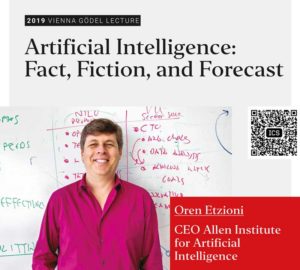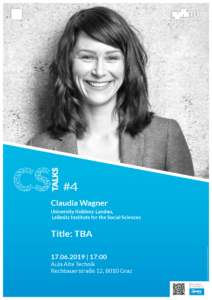
Veranstaltungen Suche und Ansichten, Navigation
Mai 2019
Infoabend Artificial Intelligence – Linz
Alles über den neuen Bachelor- und Masterstudiengang AI. Am 7. Mai findet im Science Park 3 der erste Informationsabend der JKU Linz zum Bachelor- und Masterstudiengang Artificial Intelligence statt. Künstliche Intelligenz hält Einzug in unseren Alltag: selbstfahrende Autos, Pflegeroboter, intelligente Haushaltsgeräte, autonome Bewässerungs- und Düngesysteme, smarte digitale Assistenten... All diese Themen und viele mehr werden im Bachelor- und Masterstudiengang der Artificial Intelligence am Linz Institute of Technology (LIT) behandelt. Du willst ganz vorne mit dabei sein wenn es darum geht,…
Erfahren Sie mehr »TEWI-Kolloquium: Artificial Intelligence (AI) in media applications and services
Dr.-Ing. Christian Keimel Abstract: Artificial Intelligence (AI) is nowadays used frequently in many application domains. Although sometimes considered only as an afterthought in the public discussion compared to other domains such as health, transportation, and manufacturing, the media domain is also transformed by AI enabling new opportunities, from content creation e.g. “robojournalism” and individualised content to optimisation of the content production and distribution. Underlaying many of these new opportunities is the use of AI in its current reincarnation as deep…
Erfahren Sie mehr »Why AI is shaping our games
Dr. Johanna Pirker Abstract: AI is used to create parts of our games. It provides intelligent enemy behavior, techniques such as pathfinding or can be used to generate in-game content procedurally. AI can also play our games. The idea to train computers to beat humans in game-like environments such as Jeopardy!, Chess, or soccer is not a new one. But can AI also design our games? The role of Artificial Intelligence in the game development process is constantly expanding. In…
Erfahren Sie mehr »Estimating Space-Time Covariance from Finite Sample Sets
Dr. Stephan Alexander Weiss Covariance matrices are central to many adaptive filtering and optimisation problems. In practice, they have to be estimated from a finite number of samples; on this, I will review some known results from spectrum estimation and multiple-input multiple-output communications systems, and how properties that are assumed to be inherent in covariance and power spectral densities can easily be lost in the estimation process. I will discuss new results on space-time covariance estimation, and how the estimation…
Erfahren Sie mehr »Conference: infraHEALTH 2019
The 7th International Conference on Infrastructures in Healthcare at TU Wien, Vienna, Austria “Infrastructures for Healthcare” started out as a biennial workshop, from 2019 a biannual conference. The events were held so far in different universities in Copenhagen, Denmark (2007, 2009, and 2011), the Arctic University of Norway (Tromsø), Norway (2013), Fondazione Bruno Kessler and University of Trento, Italy (2015), and again in Denmark, Aarhus University (2017). The seventh edition will be a conference and take place in Vienna, Austria.…
Erfahren Sie mehr »Juni 2019
Conference: Communities and Technologies (C&T)
The 9th International Conference on C&T - Transforming Communities, TU Wien, Vienna, Austria The biennial Communities and Technologies (C&T) conference is the premier international forum for stimulating scholarly debate and disseminating research on the complex connections between communities – in their multiple forms – and information and communication technologies. C&T 2019 welcomes participation from researchers, designers, educators, industry, and students from the many disciplines and perspectives bearing on the interaction between community and technology, including architecture, arts, business, design, economics,…
Erfahren Sie mehr »2019 Vienna Gödel Lecture – Artificial Intelligence: Fact, Fiction and Forecast
How should we think about Artificial Intelligence (AI) and its progress in recent years? Does AI threaten humanity, or will it be a source of beneficial technology? Oren Etzioni’s talk will address these issues building on work at the Allen Institute for AI (www.allenai.org), a non-profit research institute based in Seattle.
Erfahren Sie mehr »CS-Colloquium mit Univ.-Prof. Dr. Nikolaus Forgó
CS-Colloquium mit Univ.-Prof. Dr. Nikolaus Forgó (Universität Wien) zum Thema: "Alles verboten? Blockchain und Smart Contracts aus datenschutz- und zivilrechtlicher Sicht" Abstract Der Vortrag gibt einen Überblick über datenschutz- und zivilrechtliche Herausforderungen, die der Einsatz von Blockchain-Technologien mit sich bringt. Ein besonderer Fokus wird auf Betroffenenrechten sowie der Rückabwicklung von Datenverarbeitungen liegen. Bio Univ.-Prof. Dr. Nikolaus Forgó, geboren 1968 in Wien, studierte Rechtswissenschaften in Wien und Paris. Danach war er Assistent und IT-Beauftragter an der juristischen Fakultät der Universität Wien.…
Erfahren Sie mehr »Teaching about AR and Teaching with AR
PD Dr. Ralf Klamma Abstract: Augmented Reality (AR) is on the way to establishing itself in business and teaching once more. However, there is a lack of uniform guidelines or even standards both in the creation of teaching materials and in the use of AR in teaching. In addition, the industry needs enough well-trained specialists who can implement the established AR concepts, making a transfer from university to industry necessary. Therefore, in this talk we address both challenges in teaching…
Erfahren Sie mehr »CS Talk #4: Claudia Wagner
Zur Vortragsreihe CS Talks, die die zentrale Bedeutung der Informatik in unserer Gesellschaft in den Mittelpunkt stellt, werden ausschließlich Computerwissenschafterinnen eingeladen werden. Beim CS Talk #4 am 17. Juni 2019 um 17 Uhr wird Claudia Wagner von der Uni Koblenz-Landau am Rednerpult stehen.
Erfahren Sie mehr »


